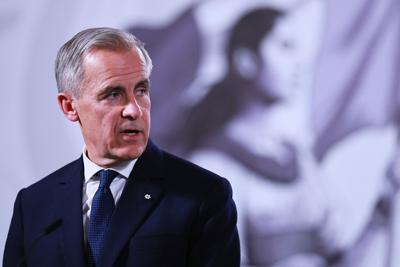Let me give you a scenario. See if it sounds familiar.
After years of Liberal rule, a Conservative party is swept into office on the strength of a campaign promising to cut waste and invest more strategically.
Soon, that new government faces its first real test: the budget.
In the lead-up, they issue stern warnings that portend difficult decisions. Efficiencies are being sought. Deep cuts are in the offing.
Far from being a political vulnerability, this is treated as a coup ŌĆö a return to fiscal sanity. And the signal is crystal clear: the grown-ups are back in charge, and the big red pen is coming out.
This, of course, is the standard script for many newly formed conservative governments, here at home and around the world.
And it might have been the story of Mark Carney ŌĆö were it not for that one pesky, complicating detail: he doesnŌĆÖt lead a new governing Conservative party. He leads the same Liberal one that presided over the overspending in the first place.
That legacy creates a profound communications challenge. Far from invigorating his base, Carney may well be forced to alienate key parts of it in the name of restoring fiscal order.
Layer on a shrinking economy and rising unemployment and you get quite the predicament.
But itŌĆÖs precisely the nature of that predicament that makes the communications strategy surrounding this budget absolutely critical.
Political rollouts of this magnitude tend to follow a predictable choreography.
Step one: lay the foundation. Almost immediately after taking office, Carney directed his ministers to identify ŌĆ£ambitious savings,ŌĆØ with an overall target to cut operational spending by 7.5 per cent for the 2026-27 fiscal year.
Step two: set realistic expectations. Last Sunday, the Prime Minister announced that the deficit ŌĆ£will be bigger than it was last year.ŌĆØ (For the record, last yearŌĆÖs figure was an eye-watering $61.9 billion.)
Step three: apply a touch of budgetary finesse. On Tuesday, Finance Minister Fran├¦ois-Philippe Champagne told reporters that the government will draw a line between operational spending and capital investments (as is done in the UK). Translation: operational costs will be trimmed, investments in infrastructure, defence and housing will grow.
Final step: drive home a clear, concise political message.
That final part is still emerging. But I would argue the path is clear.
Because the communication around this budget doesnŌĆÖt have to be defensive, or an act of tightrope walking.
On the contrary, itŌĆÖs an opportunity to show Canadians that the Liberal party has turned the page from the Trudeau era. To demonstrate the progressive base holds zero sway. That the age of expansive social programming and limitless spending is dead and gone.
No apologies required.
Will some voices on the progressive flank howl in betrayal? Yes, they will.
But Mark Carney was not elected as the heir to Justin TrudeauŌĆÖs political project. He won on a different promise entirely ŌĆö one rooted in economic expertise and a credible plan to steer the country through global uncertainty.
That movement, his new tent, was never about the progressive base. It consisted in peeling away soft Conservative support and capitalizing on the fact that the NDP voters had no other choice to stop Poilievre.
That math hasnŌĆÖt changed.
So, hereŌĆÖs my message to the Liberal strategists: ItŌĆÖs not a vulnerability to communicate about cutting waste. It is an asset. Lean into it.
To be clear, there will be a political penalty to be paid. Pockets of that progressive support will be infuriated.
But to be blunt, those voices donŌĆÖt have a dog in the fight.
The Carney government will not ŌĆö and cannot ŌĆö deliver cuts with the same relish and ideological clarity as a Conservative government. But they can make a powerful case that the age of indulgence is over, and that every dollar spent must now be justified against the stark backdrop of global volatility and a domestic affordability crisis.
No matter what, Pierre Poilievre will say this budget overspends and underdelivers.
But if Mark Carney can demonstrate that the government is reining in waste and investing strategically, he doesnŌĆÖt just rebut the opposition, he redefines the Liberals. He sends a reminder his is a new government not just in leadership, but substance.
And given where Liberals stood in the polls just one year ago, delivering that reminder and proving that transformation isnŌĆÖt just worthwhile, itŌĆÖs essential.
Error! Sorry, there was an error processing your request.
There was a problem with the recaptcha. Please try again.
You may unsubscribe at any time. By signing up, you agree to our and . This site is protected by reCAPTCHA and the Google and apply.
Want more of the latest from us? Sign up for more at our newsletter page.



























To join the conversation set a first and last name in your user profile.
Sign in or register for free to join the Conversation